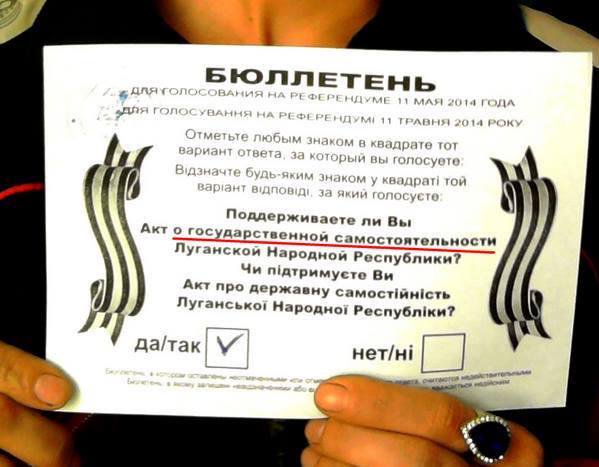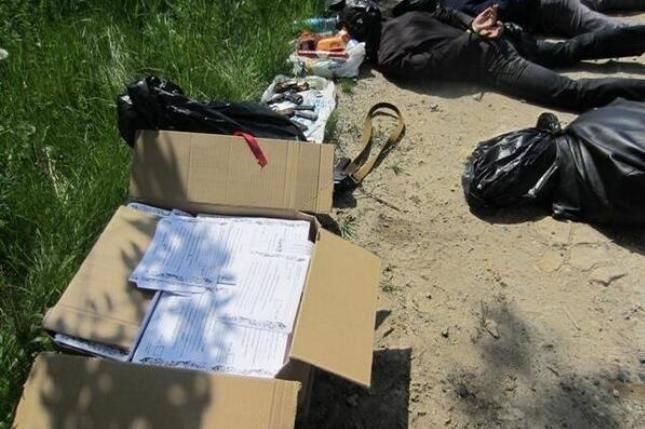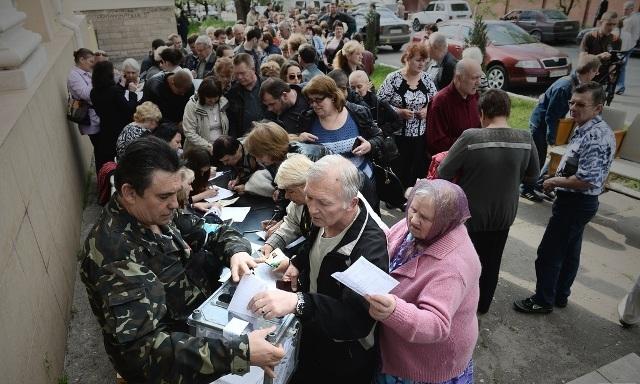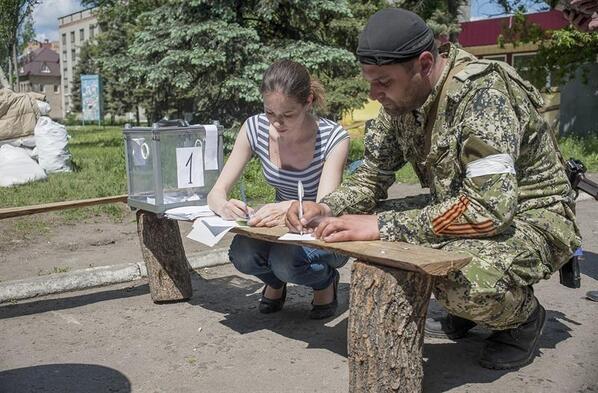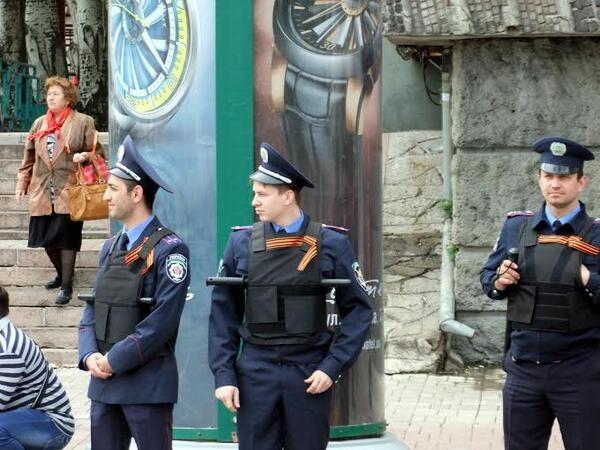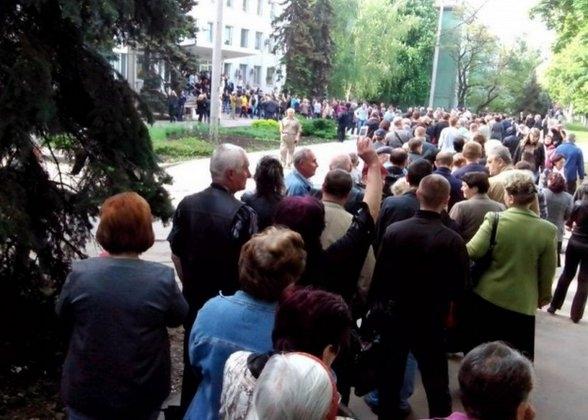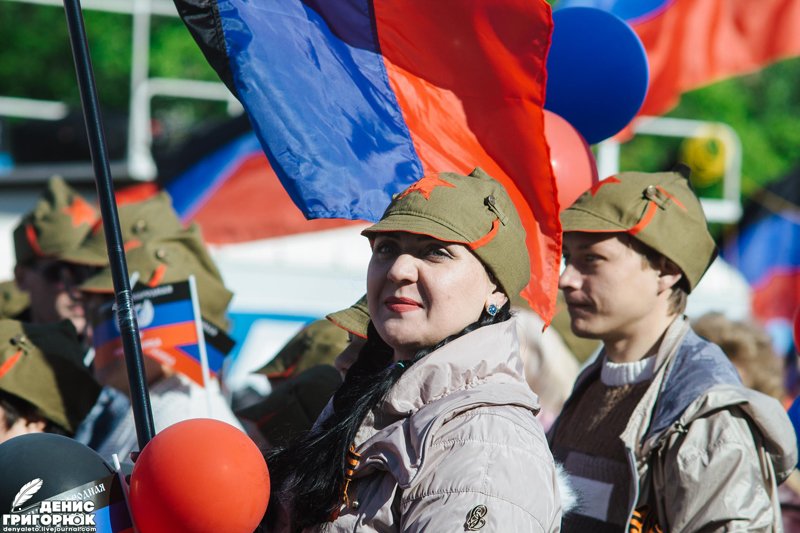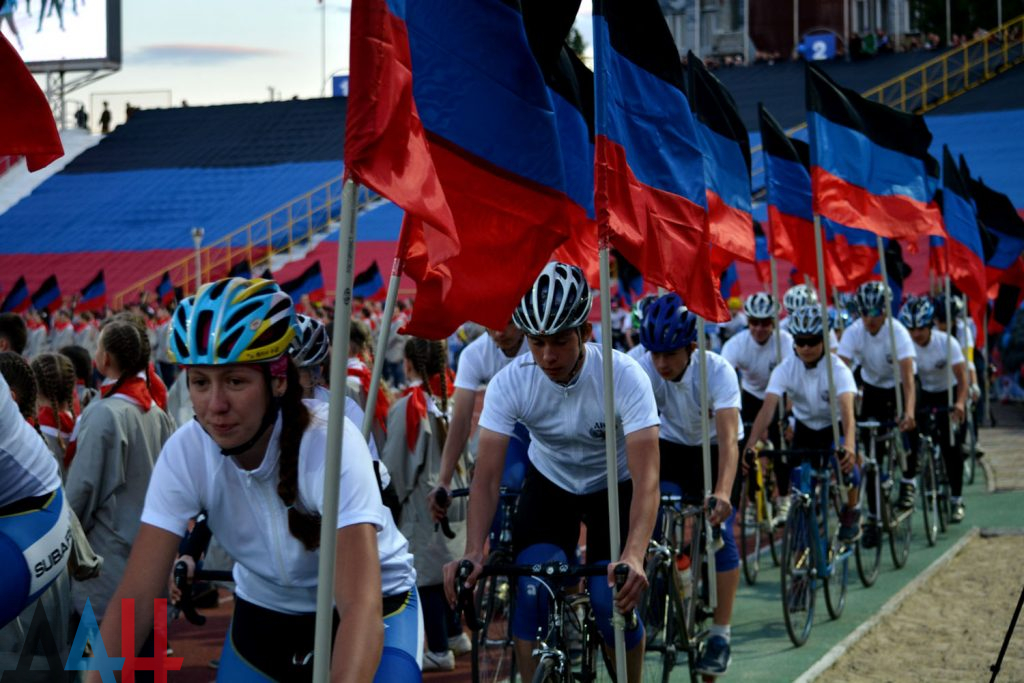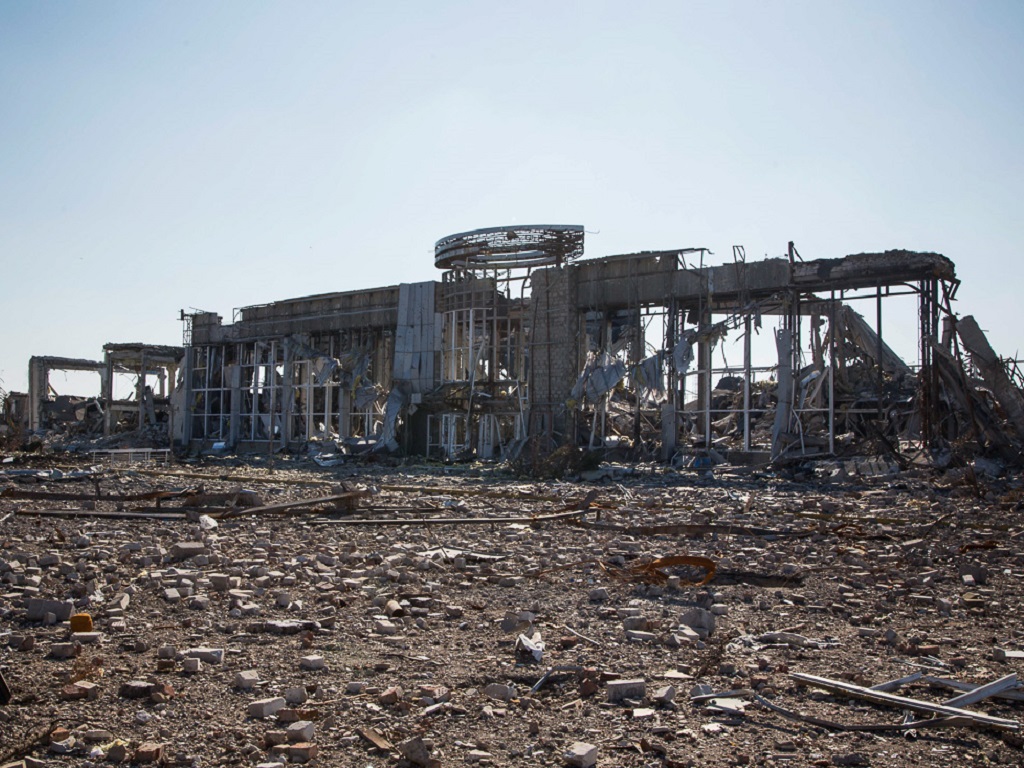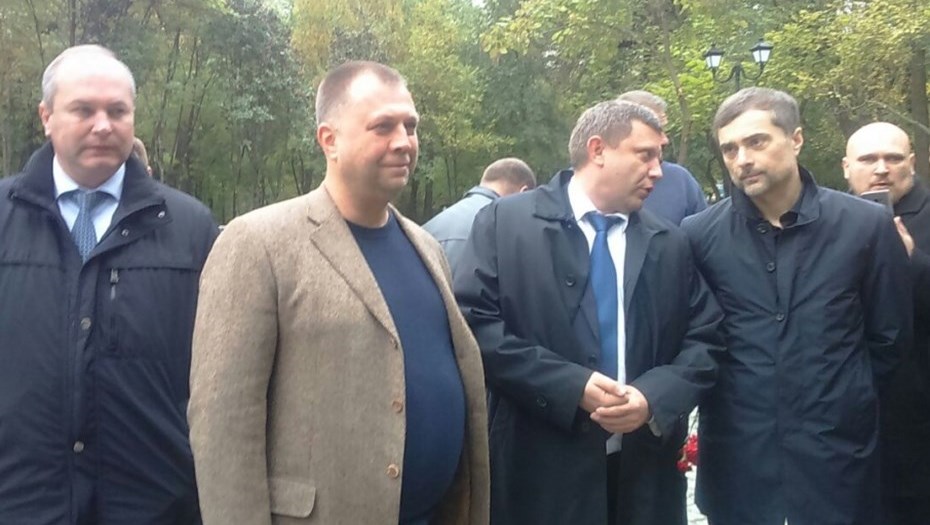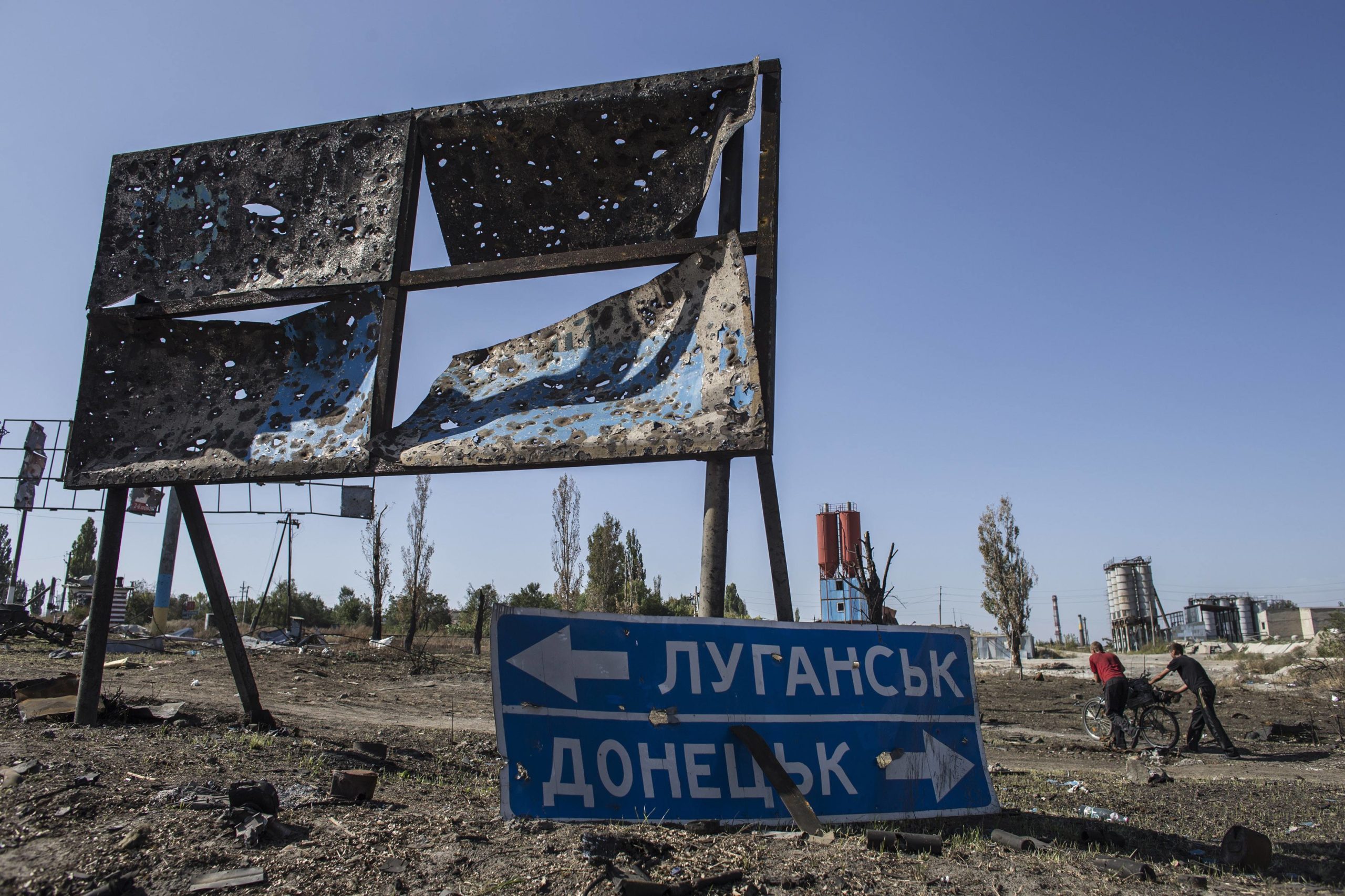Three years ago, on 11 May 2014, illegal "referendums" were held in occupied cities of Donetsk and Luhansk oblasts to create an illusion of all-region wide decision to separate from Ukraine. This farce, organized with Russian support, was held without any legal basis, independent observers, voting booths in places, and electoral register, but with bulletins printed on office printers, armed men at every poll station, and allowance to vote for absent persons. A small fraction of available poll stations was open in several cities in the occupied region (for example, 4 of 216 in then occupied Mariupol), creating the illusion of a huge turnout and support for the geopolitical move. Of course, no Russian officials were formally involved in staging referendums, everything was done by so-called local militia supported by local Ukrainian authorities of occupied cities.
The question was "Do you support the act of state independence of the Donetsk (or Luhansk) people's republic?"
A day before the referendums, then OSCE Parliamentary Assembly president Ranko Krivokapić said, "The idea that free and fair voting could take place in these so-called referendums is absurd. Not only are these referendums completely illegitimate in the eyes of the international community, they would be taking place amid a climate of fear, violence and lawlessness that is sure to keep many away from polling places."
The announced result of 89% of voters voting in support of separation in the Donetsk Oblast matched the number requested by Russian politician Aleksandr Barkashov in a tapped conversation that the Ukrainian Security Service (SBU) published a week before the poll. Luhansk Russia-backed groups didn't even try to be realistic and announced that 96% of the voters favored the "Luhansk people's republic."
Ukrainian officials said, relying on their internal sources and experts present on May 11 in the Donetsk Oblast, that the turnout was in fact much lower than the number of 75% announced by the separatist leaders - 24% in Luhansk Oblast and 32% in Donetsk Oblast, and that in many towns the voting was not held at all.
Read also: Turchynov: 24% Residents Of Luhansk Oblast and 32% of Donetsk Oblast Voted in So-Called ‘Referendum’
Earlier in April, amid a massive propaganda campaign in Russian media, militants cracked down on dissidents and cleaned up the local information field to not only create the illusion of full support of the Russian aggression in the region but to also influence the worldview of its residents in a way favorable for Russia. In May 2016, many Donetskers and Luhanskers believed the colorful propaganda picture of annexed Crimea on Russian TV, and they believed rumors that fascists from Western Ukraine who failed to get to Crimea are on their way to the Donbas to kill everyone.
Ukrainian banks, delivery services, railways, factories, state post service, and treasury were still functioning and people who believed Russia were optimistic of the future. Nobody of them could believe that the unraveling de-facto occupation would lead to the total destruction of normal life in the region, severe economic and social decay, and transport crisis. Meanwhile, trains leaving Donetsk and Luhansk were already crowded by the first wave of internally displaced persons, the Donbas refugees.
Celebrating an illusion
The so-called Donetsk and Luhansk people's republics celebrate the days of independence on 11 and 12 May, moving the beginning of their histories to the farse referendum in 2014. The occupation authorities are full of optimism about the future of occupied territories, as are the Russian media and so-called information agencies of Donetsk and Luhansk. The information field in the occupied territory remains under Russian and separatist control since 2014 and serves to generate Soviet-style news about great achievements of wise rulers, about treacherous Ukraine and brotherly Russia.
Read also: Only 18% identifies with Kremlin-backed “DNR” – survey (2016)
Grim reality
No real country recognized Russian puppet statelets in the Donbas since 2014 referendums. Only one of Russia's post-Soviet puppet states, South Ossetia, recognized both Luhansk and Donetsk "people's republics." In 2008, Russia recognized the independence of South Ossetia, one of Russia's frozen conflict zones in Georgia. Now South Ossetia intermediates between Russia and Donbas puppet states to make economy operations between Russian companies and breakaway Ukrainian regions legal in Russia.
Read more: Russia’s involvement in Donbas war open secret in Donetsk – France 24
Most of the factories operating in 2014 are either closed down or cut back on production. Two months ago, occupation authorities seized the last normally operating enterprises which remained under Ukrainian jurisdiction in the occupied territory, most of the grabbed assets are idling as of now, workers are on paid leave.
The economy of the occupied regions fully depends on Russia which sends humanitarian convoys and pays the salaries and pensions of people who live in the occupied territories. The attempts to entice investors and organize tax collection failed. The Russian-backed leaders continue to talk about the unshadowing of the economy while enclaves' economies remain based on small-scale trading and smuggling.
No real bank operates in the occupied territory. Russian banks didn't enter the occupied region, occupation authorities opened so-called republics' banks using the stolen equipment of deserted bank offices. Point-of-sale terminals are widely used for cashing out money but it is next to impossible to open a bank account, transfer or receive money, buy something online.
No Ukrainian and international delivery services remained in the occupied territory. An attempt to send or receive something is kind of a challenge for a resident of occupied areas. So-called Post of LNR and Post of DNR deliver letters and packages only within the occupied territories, you cannot even send a letter to Russia.
There is no passenger transport but busses, marshrutka minibusses, and several suburban trains. Russian-hybrid troops destroyed both passenger airports in the region in 2014-2015. Ukrzaliznytsia (Ukrainian railways) suspended passenger service in the occupied territories in July 2014.
#Luhansk, empty #railway station @24todaynetua https://t.co/9OioZwsI9M pic.twitter.com/hcNOgT2g0I
— English Luhansk (@loogunda) October 22, 2016
No real employment opportunities are accessible for residents of the Russia-controlled territories. First of all, you can become a militant, it is the most gainful employment possible. If you don't want to fight against Ukraine, you can become a marketeer or obtain any other unskilled job. The third way is to seek for seasonal employment in Russia.
There is no normal life in Luhansk and Donetsk Oblasts since Russia invaded Ukraine in 2014. And there will be no normal life until Russia leaves the region.
Read more:
- A guide to Russian propaganda
- Stages of Russian occupation in a nutshell
- Russia orchestrating Donetsk “referendum”
- Donetsk workers forced to sign “referendum” petitions
- Separatists: Donetsk Oblast Status the Same Post-Referendum
- ‘Referendums’ turnout: 10% of voters
- “DNR’s” propaganda apparatus exposed. Part 1: “Russophobe, get him out of Donetsk”
- “DNR’s” propaganda apparatus exposed. Part 2: How “DNR” censored Ukraine’s leading TV channels
- Why Ukraine must avoid the Transnistrian scenario
- The Kremlin’s five steps towards recognizing “DNR/LNR”
- Policy shift shows Russia preparing to recognize its puppet republics in Donbas
- Occupied Donbas risks becoming like South Ossetia
- Russian proxy republics campaign to “reunite people of Donbas” and other political developments in the “LNR” and “DNR”
- 5 explanations for the Russian “Kyiv junta” myth
- Don’t call terrorists in eastern Ukraine “rebels” because they are not


